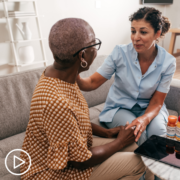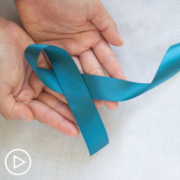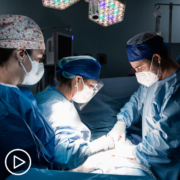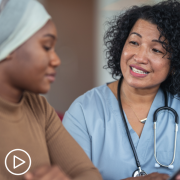Are Endometrial Cancer Outcomes Worse for Underrepresented Patients?
Are Endometrial Cancer Outcomes Worse for Underrepresented Patients? from Patient Empowerment Network on Vimeo.
How do endometrial cancer outcomes compare for patients from marginalized groups? Expert Dr. Ebony Hoskins shares risk factors for optimal endometrial cancer care and advice for patients to receive assistance for their care.
Dr. Ebony Hoskins is a board-certified gynecologic oncologist at MedStar Washington Hospital Center and assistant professor of Clinical Obstetrics and Gynecology at Georgetown University Medical Center.
[ACT]IVATION TIP
“…asking the question about their risk. If someone is not insured, asking the hospital or a cancer center that’s there about any resources that are available to say, patients who are uninsured or underinsured, there are programs that are there. And even for medications, some of the manufacturers have programs that pay for medications.”
Download Guide | Descargar Guía en Español
See More from [ACT]IVATED Endometrial Cancer
Related Resources:
Transcript:
Mikki:
Dr. Hoskins, is endometrial cancer worse for a marginalized population? And are there any specific risk factors that put some at risk more than others?
Dr. Ebony Hoskins:
So I think marginalized populations, I think we could say minority populations, we can say Black women, we can say Hispanic women, and we can say people who, I’m trying to define, if you were the marginalized, patients who don’t have access to care. Yes. I definitely think that you could or they could have a worse outcome, whether it’s for lack of access for someone who may not be insured or for patients who may be in this country without proper documentation getting the medical care that they may need. Yeah, I think it can certainly be and I’ve seen those. I think risk factors, and we’ve talked about race as being a risk factor, and again, access to care is certainly a risk factor.
I think those are probably the bigger risk, if you will. So my activation tip for patients would be asking the question about their risk. If someone is not insured, asking the hospital or a cancer center that’s there about any resources that are available to say, patients who are uninsured or underinsured, there are programs that are there. And even for medications, some of the manufacturers have programs that pay for medications. So I think in asking the ask the question, I have no problem asking a question, right. So we, I think asking for yourself is not going to hurt.
Mikki:
Okay. Well, Dr. Hoskins, we know the endometrial cancer outcomes among populations that are disadvantaged. How are you and your colleagues changing this?
Dr. Ebony Hoskins:
So disadvantaged populations could be patients who live in rural areas, patients with gender identity changes. So I think in terms of that, I think our Society of Gynecologic Oncology recognize it. I think number one, we have to recognize who the people are, and who these populations are. And then at least from our most recent annual meeting have noted more, talks that are about it. So it’s just more education that we are, seeing in, again, even more, some more data, particularly with patients that live in rural communities where they have lack of access to say a gynecologic oncologist, where they have to travel. And so I think one, recognizing it, and in terms of what’s being done I think there’s more to come. My activation tip for patients would be if you are in a disadvantaged population, perhaps inquiring with let’s say local groups that you are aligned to or even let’s say someone who may live in a rural community to figure out where they can get the best care that’s local to home. So, and I mean, these are things that we recognize that may be coming about soon.












